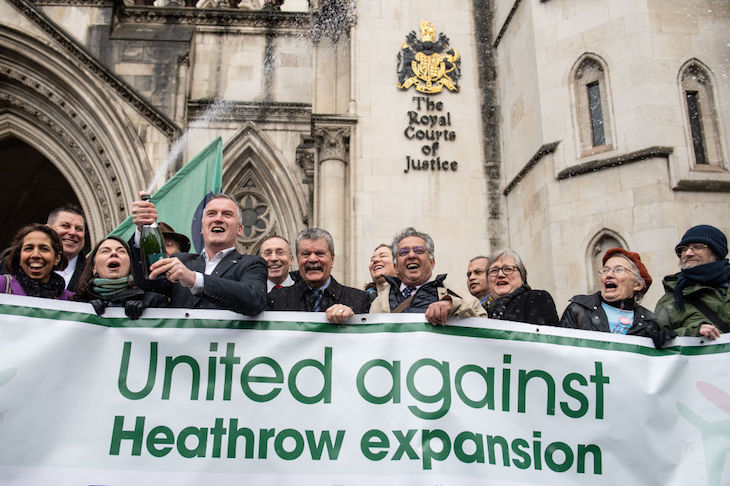It may well be, as Tom Goodenough argued here earlier, that Boris Johnson is secretly delighted at the Court of Appeal’s ruling that is was illegal for the government to give the go-ahead to a third runway at Heathrow without taking into account their own climate policy.
The Prime Minister had, after all, promised his constituents that he would lie down in front of the bulldozers to stop a third runway. He now has the cover of a court decision to shield him from the Conservative party’s pro-runway elements if the project ends up being dropped.
But the Prime Minister should be extremely concerned about the wider implications of this judgement. It is yet one more example of power draining away from elected government in Parliament, towards the courts. The courts are coming back again, and again, interfering in decisions which ought to be taken in the realm of politics.
Part of the reason for this transfer of power is activist judges. Increasingly they are flexing their muscles by straying into political decisions – something a few of us have long been opposing, recently joined by Lord Sumption in his Reith lectures last year. But a large part of the blame lies with the government itself (by which I mean the Conservative-led coalition, Cameron and May governments, as well as the Johnson administration). It continues to pass laws placing legal obligations on itself to reach targets and objectives. By doing so it is inviting activists to challenge decisions in court.
As the judge pointed out in his ruling, he hasn’t strictly ruled out a third runway. What he did rule was that the government had failed to take into account its own climate policy when making the Heathrow decision. But who passed the Climate Change Act which imposed a legally binding target to slash carbon emissions by 2050? The original act was introduced by the Brown government in 2008, but the Cameron-led Conservative opposition supported it with minimal dissent – only six MPs failed to vote in favour of it. That committed the government to reducing carbon emissions by 80 per cent, compared with 1990 levels, by 2050. Then, last summer, the May government upped the target to net zero emissions.
Given the government has no detailed plan as to how it will achieve this feat without crashing the economy, or exporting our remaining manufacturing industry, the zero-carbon target presents activists with a means to challenge any government policy they feel is inconsistent with this goal. That means just about every new road, airport, gas-fired power station – not to mention HS2. Could the government demonstrate that HS2 is consistent with zero carbon emissions by 2050? I doubt it, given the steel and cement involved in its construction.
Is the government going to be able to freeze fuel duty in the Budget? That too could be said to be inconsistent with working towards zero emissions. Then again, is Rishi Sunak going to be able to announce any spending increase? I am not a lawyer, but there doesn’t seem to me to be any reason why, say, the Taxpayers’ Alliance should not go full Gina Miller and take the Chancellor to court on the basis that he has failed to run a surplus – something which was written into George Osborne’s Charter for Budgetary Responsibility. This requires governments to run a surplus during ‘normal times’ when the economy was growing at more than one per cent a year.
Two weeks ago, the Prime Minister appointed Suella Braverman as attorney general in an apparent attempt to rein-in the power of activist judges. It would help if the government stopped passing laws which, by placing legal obligations on itself, help shift power to the courts.







Comments